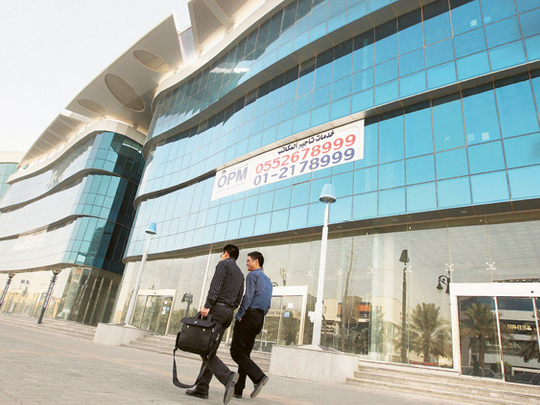
Dubai: A succession of favourable factors should ensure Saudi Arabia's real estate market starts the new year on a solid footing.
The current global oil prices being where they are, the Saudi economy is on track to record another year of sound growth, which would in turn set off increased corporate activity.
That would translate into heightened demand for office stock, particularly the new ones that are coming through the development pipeline. And there's quite a lot of that happening.
"Jeddah has traditionally lacked a central business district as well as any international grade A [office] stock," said Stefan Burch, associate at Cluttons, the property consultancy.
"This looks set to be addressed in the short term as new developments come online which will provide about 350,000 square metres of commercial space over the next three years."
Such is the case in Riyadh, the kingdom's financial centre, as well. There's all of the new supply that will come up at the King Abdullah Financial District and in Information Technology Communications Complex (ITCC), billed as the kingdom's first "smart city".
Much of the new office build in Riyadh is located to the north of the existing CBD on King Fahad Street.
A steady flow of completed commercial projects would also ensure that rentals and prices remain honest and not subject to any irrational spikes. "We do not see any reason for large increases in rental values as the new supply looks set to counteract [such a possibility]," added Burch.
Office leasing
According to a new report issued by Jones Lang LaSalle (JLLS), multinationals, including GE and Siemens, have been heavy hitters in Riyadh's office leasing space. Siemens took on 9,000 square metres on lease, while GE's health care division did so with 1,300 square metres. The likes of JP Morgan and Barclays were content with 800 and 500 square metres respectively.
Average rents at the top end of the spectrum range between 1,000 to 1,500 Saudi riyals (Dh979 to Dh1,469), while Grade B buildings fetch 600 riyals to 850 riyals.
Multinationals are using the current soft rental market to upgrade to new premises that are "compliant with corporate space standards", according to the JLLS report. Simultaneously, the robust economy is also pulling new businesses.
Government agencies have also been on the lookout for new space, with the Ministry of Justice absorbing 24,000 square metres in what JLLS calls the "largest deal of the year".
"What is impressive in 2010 is that so much of the new supply is being absorbed," the report added. "Several of the towers of the King Abdullah Financial District are now emerging.
Occupancy
"Substantial infrastructure in terms of power, district cooling, IT network and a mono-rail system still needs to be put in place and we expect tenants will be able to target occupation for 2013. Lease negotiations with the various landlords should be possible from next year."
An estimated 200,000 square metres of new office space would have been completed in Riyadh this year, and would be repeated next year.
"Strong local demand has kept vacancy levels at around 10 per cent, despite the significant level of additional supply brought to the market during 2010," the JLLS report said.
"Rentals have declined across the market, with the greatest falls being experienced for buildings outside of the CBD, older buildings and those where landlords are seeking to lease the whole building to a single tenant."
However, a low rent regime need not get in the way of the overall wellbeing of the marketplace. On the contrary, it can actually help the latter's cause.
"If developers can respond to real demand by providing the correct type of real estate offering, as infrastructure projects are completed and the business confidence that Saudi Arabia has enjoyed recently continues, we see a bright future in the medium term," Burch said.
Affordability
Residential offerings
Affordable housing is the recurrent theme that is being heard in Saudi Arabia's residential market. But the one key category that can do something about this, the developers, are turning a deaf ear to the clamour.
"Financing still remains tight within the lower income bracket, which is the very segment where we see large levels of demand," said Stefan Burch of Cluttons. "Until the dislocate between residential offerings and effective demand has been removed, we do not see a reason for residential values to increase by a great amount in the short term."
The Jones Lang LaSalle report also found credit to be tight, but added that "regulations restricting sales until infrastructure has been completed have discouraged the development of large communities, as few players have the funds to develop the infrastructure on land parcels of one million square metres.
"Some developers have funds committed to incomplete projects where partial infrastructure has been developed. The lack of additional financing is resulting in developers being unable to complete the infrastructure and start the construction of such projects.
"Most new projects are small scale, reflecting the piecemeal nature of the development industry with most developers unable to finance major new projects."
The authorities could help sort out the situation. They will need to, and on a priority basis at that, as the kingdom's population is expected to have crossed 27 million. Much of the increase has been brought on new expatriate arrivals, indicative of an economy that is ticking along nicely and in turn creating new opportunities, especially on the infrastructure side. "Given the high government spending planned over the next few years, further growth in the expatriate population can be expected," said the JLLS report. Deep Marwaha, director of Cityscape Riyadh 2010, which was held last week, said that even though the region has an oversupply in the market, Saudi Arabia is seeing a major demand.
Doubts:
Mortgage law
For some years now, Saudi Arabia's mortgage law, a long time in the making has been seen as the Next Big Thing for its property market. As 2010 closes, while it still is seen as one, some doubts have started to creep in.
"A number of banks we have spoken to do not feel that the proposed mortgage law addresses their issues with security and the ability to enforce against non-payments," said Stefan Burch of Cluttons.
The government entity, the Public Pension Agency has launched a home loan programme, while the Deutsche Gulf joint venture is also expanding its lending activity.












